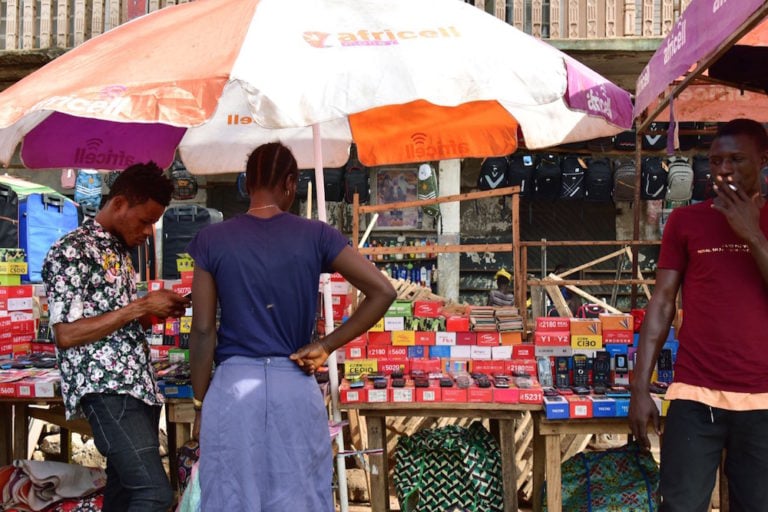A community-based radio station, Katutura Community Radio (KCR), which has been on air for more than a year, has been told by the licensing authority it must move frequencies or else close down after a new commercial station targeting KCR’s township audience was allocated a frequency just 0.3 megahertz (MHz) away from the community broadcaster. […]
A community-based radio station, Katutura Community Radio (KCR),
which has been on air for more than a year, has been told by the
licensing authority it must move frequencies or else close down
after a new commercial station targeting KCR’s township audience
was allocated a frequency just 0.3 megahertz (MHz) away from the
community broadcaster. KCR was established in August 1995, and
serves the previously-segregated communities of Khomasdal and
Katutura townships.
KCR Director Frederick Gawaseb said he first learned of the new
station, Radio Energy, when an advertiser complained of
interference from the new commercial station on the KCR’s
allocated frequency, 106.2 MHz. Gawaseb fears that the allocation
of Radio Energy’s frequency so close to KCR could be “deliberate.”
Gawaseb said that, although he has taken up the matter with the
licensing authority, the Namibian Communications Commission (NCC),
he was surprised at the decision to allocate a frequency so close
to the KCR. Gawaseb said that NCC took the decision without
consulting KCR, but added, “When I wrote NCC to complain, they
asked us to move our frequency, instead, to 104 MHz. Why should we
move when we were the first to be allocated this frequency ?”
In a letter to KCR dated 13 September 1996, NCC wrote: “The
International Telecommunications Union’s frequency allocation plan
for broadcasting made provision for a limited number of
frequencies for Region 1. Due to the above-mentioned the
Commission are compelled to request you change frequency to 104.0
MHz.” However, Gawaseb said this decision had been taken before
the Commission had discussed the matter. In a separate communique,
however, the NCC said it had scheduled a hearing into the KCR’s
complaint for 25 September.
MISA’s Broadcasting Co-ordinator, John Barker, said, “This could
be a deliberate sabotage or else complete incompetence by whoever
allocated the frequency in the first place,” adding, “the first is
more likely.” Barker said that the person allocating a frequency
close to that of KCR “was doing so with full knowledge of the
effect and the impact” it would have on KCR. “This is giving some
people unfair commercial advantage over others and it’s
unacceptable,” Barker said.
The Deputy Director of the NCC, Jan Kruger, said on 19 September
that the shifting of frequencies was in response to the new
frequency plan as approved by the International Telecommunications
Union (ITU). Kruger told MISA, “If KCR does not want to move, we
will have to close it down because we have the jurisdiction to
move people.” Kruger said that currently there are 12 radio
stations in the country that will have to be moved to new
frequencies.
The Vice President of the Africa section of the World Association
of Community Radio Broadcasters (AMARC), Lumko Mtimde, told MISA
that ITU was not responsible for allocating frequencies for local
stations in a particular country. “A country itself allocates or
re-allocates frequencies for its stations. Countries can only
inform the ITU of the changes made,” Mtimde said.
The Bureau for the Development of Telecommunications in Geneva,
which works together with the ITU, also denied that it was ITU’s
responsibility to allocate frequencies for a country. The
Councillor in Sound Television and Broadcasting at the Bureau,
Petko Kantchenv, said, “There is a misunderstanding. We cannot
enforce technical frequency parameters for a country.” Kantchenv,
however, said the acceptable frequency distance between stations
was 300 KHz (0.3 MHz), but recommended 400 KHz (0.4 MHz).
A company owned by the ruling South West Africa Peoples
Organization (SWAPO) party, Kalahari Holdings, has majority shares
in Radio 100, the company which owns Radio Energy. Kalahari
Holdings also has shares in Multi-Choice Namibia, a private
television channel. Meanwhile, the Democratic Media Holding (DMH)
company, which owns several newspaper titles and the country’s
only newspaper printing press, has shares in Antenna 99, the
holding company of both Radio 100 and another commercial radio
station, Radio 99. Directors for Radio Energy are also directors
for Radio 99, with shares in both radios.
The NCC, which is legally an independent body, is currently funded
directly by the Ministry of Information, and, apparently owing to
a lack of adequate funds, the NCC relies on the parastatal
Namibian Broadcasting Corporation (NBC) to administer frequencies
for broadcasters in the country.
The Director for Radio Energy, Mario Aita, said if his station was
to be moved from 106.5 MHz, the frequency the NCC has allocated to
his new station, “someone will have to pay for the N$ 50,000
(about US$ 11,000) we have put in, because if there was any
mistake in the allocation of the frequency, it was not our fault.”
Radio Energy has erected a 500 watt transmitter while KCR is using
a 100 watt transmitter. Aita said Radio Energy is to be officially
launched on 1st October.
Background Information
The 1992 Namibia Communications Commission Act, under which the
NCC was established, states that the Commission is “responsible
for the standardisation, planning and management of the frequency
spectrum available for broadcasting, and to allocate such spectrum
resources in such a manner as to ensure the widest diversity of
programming and optimal utilisation of that spectrum resources,
and where possible, to give priority to broadcasters transmitting
the maximum number of hours per day and to community-based
broadcasters.” The Act further states that, when considering an
application for the issue of a broadcasting license, the
Commission shall have regard to “the desirability or otherwise of
allowing any person or association or persons, to have control of
or a substantial interest in … more than one radio station and
one television station and one registered newspaper with a common
coverage and distribution area or significantly overlapping
coverage and distribution areas.”
Recommended Action
Send appeals to authorities below:
decision to allocate Radio 100’s frequency so close to KCR, and in
the decision to make KCR move frequencies
keep its frequency and instead to make Radio 100 move its
frequency, in keeping with the spirit and letter of the
Communication Commission Act, and the Namibian government’s stated
commitment to promoting community broadcasting and media plurality
Appeals To
Hon. Prime Minister Hage Geingob
Office of the Prime Minister
Private Bag 13338
Windhoek, Namibia
Tel: +264 61 287 9111
Fax: +264 61 226 189
Mr. Barney Barnes
Chairperson
Namibian Communications Commission
Private Bag 13309
Windhoek, Namibia
Tel: +264 61 222 666
Fax: + 264 61 222 790
Please copy appeals to the originator if possible.


